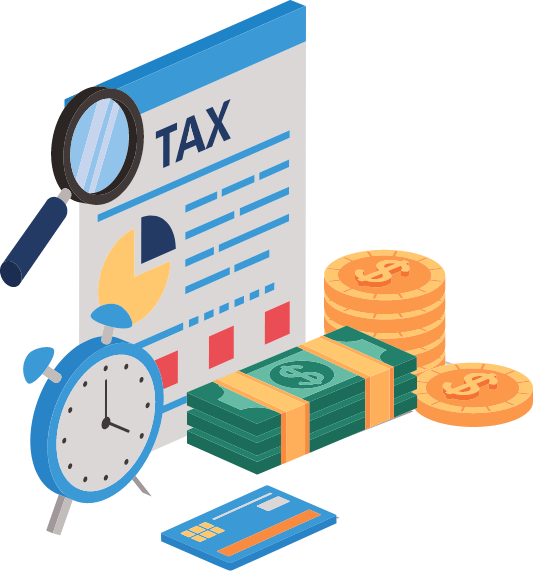Exploring Corporation
Tax Filing Options
1. C Corporation: A traditional corporation that files its own tax return (Form 1120) and pays taxes on its income. Any dividends paid to shareholders are also subject to taxes. This type of corporation is subject to double taxation.
2. S Corporation: An S corporation files Form 1120S, and the income, losses, deductions, and credits are passed through to the shareholders and reported on their personal tax returns. Shareholders must report their share of the corporation's income, whether or not it is distributed, on their personal income tax returns.
3. Nonprofit Corporation: A corporation that is organized for religious, charitable, scientific, literary, or educational purposes, and is exempt from federal income tax under Internal Revenue Code section 501(c)(3) is also known as a nonprofit corporation.

”Say goodbye to the hassle and stress of tax season with Blugency's effortless 4-step process for filing your taxes.

Step
01
Easy Submission
Submit your tax information and documents with ease by clicking 'File My Taxes,' filling out our online form, and uploading them through our secure platform.

Step
02
Tax Consultation
Let our tax experts review your information and schedule an online meeting if needed to ensure that your tax forms are filled out correctly and all necessary information is collected.

Step
03
Secure Payment
After the consultation, you'll receive an invoice for our services, and you can make a secure payment.

Step
04
Stress-free Filing
Relax, our CPA team will take care of e-filing your tax return to the IRS and handling any correspondence from the IRS on your behalf, ensuring a smooth and stress-free process for you.
Don't let tax season get you down. Trust Blugency to make the process easy and effortless for you."
Why Choose Blugency for Your Tax Filing Needs
“Expertise”: Our team consists of certified public accountants (CPAs) and Certifying Acceptance Agents (CAAs) who have the necessary education, training, and experience to handle your tax filing needs.
"Accuracy": With our expert team, you can be confident that your tax return will be accurate and filed on time, helping you avoid potential penalties or fines.
"Efficiency": We use a user-friendly platform to upload your tax documents and information securely, and our tax experts will take care of the rest, saving you time and hassle.
"Personalization": Our tax experts will tailor their services to your specific needs and provide personalized advice to help you get the maximum refund or lowest tax liability possible.
"Reliability": We are committed to providing high-quality, reliable services and will be there to assist you with any correspondence or questions from the IRS.
"Trustworthiness": We understand the importance of your personal and financial information and take the necessary measures to ensure the security and confidentiality of your data.
Common Questions About Corporation Tax Filing
Q) What is a corporation?
A corporation is a legal entity that is separate from its owners, also known as shareholders. A corporation can enter into contracts, sue and be sued, own assets, and pay taxes separately from its shareholders.
Q) What are the different types of corporations?
The most common types of corporations are C corporations, S corporations, non-profit corporations, professional corporations, and personal service corporations.
Q) What is the difference between a C corporation and an S corporation?
A C corporation is a traditional corporation that files its own tax return (Form 1120) and pays taxes on its income. Any dividends paid to shareholders are also subject to taxes. An S corporation files Form 1120S and the income, losses, deductions, and credits are passed through to the shareholders and reported on their personal tax returns.
Q) How can a corporation change its tax classification?
A corporation can change its tax classification by filing Form 2553, Election by a Small Business Corporation, with the IRS. However, it's important to note that changing the classification may have tax consequences and it's recommended to consult with a tax professional before making any changes.
Q) What are the compliance requirements for corporations?
Corporations are subject to various compliance requirements, including filing annual tax returns, keeping accurate financial records, and holding regular meetings of shareholders and directors. It's recommended to consult with a tax professional to ensure compliance with all applicable laws and regulations.
Have a question?

